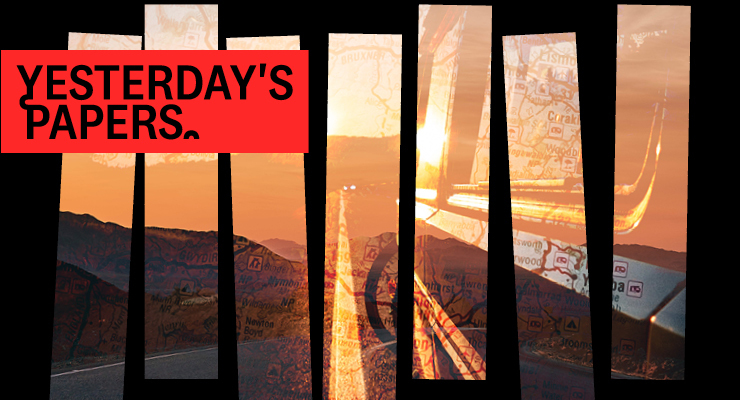
In 2020, many of us had the limits of the world shrunk to the dimensions of our living room, decidedly and indefinitely separated from anyone we loved who happened to live over locked-down borders.
Now the sun is breaking through, border restrictions are easing and Christmas is near. As befitting a road trip, this week’s playlist is longer and has a few more obvious crowd pleasers than it normally does.
For a series of albums across the mid-2000s, Bright Eyes, with Conor Oberst’s quivering toddler voice and his emotionally direct and faintly apocalyptic sense of the world, produced the perfect music for any brainy, restless and self-involved young depressive growing up during the war on terror. Here we get “Another Travelin’ Song” which starts about all the endless highways and the cities at the break of dawn and, of course, ends with an unpleasant dream.
Northern Territory legends Warumpi Band mixed just about every genre under the sun — new wave, country, rock, and something else all their own — and still didn’t sound quite like anyone else. The gorgeous homecoming song, “My Island Home” — later a hit for Christine Anu — is an uncharacteristically gentle offer from their driving 1987 debut Go Bush!
One of the great driving films of recent years is Edgar Wrights Baby Driver. The titular hero has lived his entire life among gangsters due to his superhuman abilities as a getaway driver, but doesn’t look like he could handle himself in a fight. He fills in for his social deficiencies by repeating interactions he’s seen on TV and movies. He is insular and aloof and experiences everything in the world through the filter of his headphones. At one point he delays a getaway so as better to sync up with the rhythm of The Damned’s “Neat Neat Neat”.
He is cool, graceful and a total nerd, an action hero for the kind of person who has a great record collection and likes the same kind of movies Edgar Wright likes, though I suspect Baby Driver may mark the end of the cycle where such characters command much interest in the wider culture.
The opening of the borders will allow friends and family to reunite, though tens of thousands of Australians remain in exile overseas. Via Angolan artist Bonga we close on one of the all time great songs produced in — and about — exile. It was in the atmosphere of the decaying reign of Portuguese dictator Antonio Salazar that Bonga — born José Adelino Barceló de Carvalho in the province of Bengo in 1942 — came of age. He grew into a gifted athlete, representing “Portugal” in track and field. He was also a closet revolutionary, joining the Movement for the Liberation of Angola (MPLA) and performing clandestine concerts as a protest singer, taking the name Bonga Kuenda.
His job gave him greater freedom of movement than most Angolans, which he used to smuggle information to exiled revolutionaries in Europe. Under Salazar, such activities were punishable with death or torture. When the regime finally realised what he was up to, Bonga fled into exile in Rotterdam. There, in 1972, he recorded the haunting album Angola 72 with a group of musicians from Cape Verde. The album opens with “Mona Ki Ngi Xica” which translates as “The child I leave behind”. The song is a heart- stopping lament sung in Kimbundu, and that’s before you even get to his voice. That howl, wracked with pain, yet radiating power, is a voice from somewhere beyond.
Angola 72 was regularly smuggled into Angola, and became a soundtrack for the war of independence until it came to a formal end in 1975.








Test comment